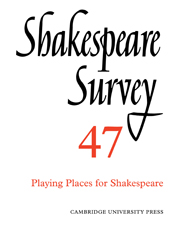Book contents
- Frontmatter
- Shakespeare Played Small: Three Speculations about the Body
- The Architecture of the Fortune Playhouse
- The Bare Island
- ‘How Chances it they Travel?’ Provincial Touring, Playing Places, and the King’s Men
- Writing for the Metropolis: Illegitimate Performances of Shakespeare in Early Nineteenth-Century London
- The Perishable Body of the Unpoetic: A. C. Bradley Performs Othello
- Playing Places for Shakespeare: The Maddermarket Theatre, Norwich
- ‘A Fairly Average Sort of Place’: Shakespeare in Northampton, 1927–1987
- The Living Monument: Self and Stage in the Criticism and Scholarship of M. C. Bradbrook
- Stratford Stages: Interviews with Michael Reardon and Tim Furby, and Sam Mendes
- Dis-Covering the Female Body: Erotic Exploration in Elizabethan Poetry
- Theseus’ Shadows in A Midsummer Night’s Dream
- ‘Time for Such a Word’: Verbal Echoing in Macbeth
- Shakespeare’s Knowledge of Italian
- Tamburline and Edward Alleyn’s Ring
- Shakespeare Performances in England, 1992–1993
- Professional Shakespeare Productions in the British Isles, January-December 1992
- The Year's Contributions to Shakespeare Studies 1 Critical Studies
- 2 Shakespeare’s Life, Times, and Stage
- 3 Editions and Textual Studies
- Books Received
- Index
The Perishable Body of the Unpoetic: A. C. Bradley Performs Othello
Published online by Cambridge University Press: 28 March 2007
- Frontmatter
- Shakespeare Played Small: Three Speculations about the Body
- The Architecture of the Fortune Playhouse
- The Bare Island
- ‘How Chances it they Travel?’ Provincial Touring, Playing Places, and the King’s Men
- Writing for the Metropolis: Illegitimate Performances of Shakespeare in Early Nineteenth-Century London
- The Perishable Body of the Unpoetic: A. C. Bradley Performs Othello
- Playing Places for Shakespeare: The Maddermarket Theatre, Norwich
- ‘A Fairly Average Sort of Place’: Shakespeare in Northampton, 1927–1987
- The Living Monument: Self and Stage in the Criticism and Scholarship of M. C. Bradbrook
- Stratford Stages: Interviews with Michael Reardon and Tim Furby, and Sam Mendes
- Dis-Covering the Female Body: Erotic Exploration in Elizabethan Poetry
- Theseus’ Shadows in A Midsummer Night’s Dream
- ‘Time for Such a Word’: Verbal Echoing in Macbeth
- Shakespeare’s Knowledge of Italian
- Tamburline and Edward Alleyn’s Ring
- Shakespeare Performances in England, 1992–1993
- Professional Shakespeare Productions in the British Isles, January-December 1992
- The Year's Contributions to Shakespeare Studies 1 Critical Studies
- 2 Shakespeare’s Life, Times, and Stage
- 3 Editions and Textual Studies
- Books Received
- Index
Summary
A. C. Bradley’s influence on generations of critics and readers of Shakespeare has often been remarked, as has the mixture of notoriety and respectful indebtedness which makes up his critical reputation. Part of the importance of Bradley’s work to the task of assessing the uses and effects of Shakespeare lies in its timely incorporation of two of the most influential impulses in modern criticism. Bradley’s monumental Shakespearean Tragedy, published in the shadow of the Victorian era, brings together Romantic criticism’s emphasis on imaginative engagement with Shakespeare’s plays and the psychologism which had been developing throughout nineteenth-century Shakespearian criticism and which, in Bradley’s work, emerges as a mode of character analysis whose unrelenting detail and literal-mindedness are unrivalled even in the work of those critics most obviously influenced by him.
Bradley, inheritor and perpetuator of critical practices hostile to the theatrical nature of the plays and to the incorporation of an understanding of the Elizabethan theatrical conditions which shaped them, is a reader of Shakespeare speaking to and instructing other readers of Shakespeare. Yet an analysis of Bradley's first lecture on Othello reveals the extent to which he is prone to reverse the polarity of reading and performance on which his critical practice is based.
- Type
- Chapter
- Information
- Shakespeare Survey , pp. 71 - 80Publisher: Cambridge University PressPrint publication year: 1994



